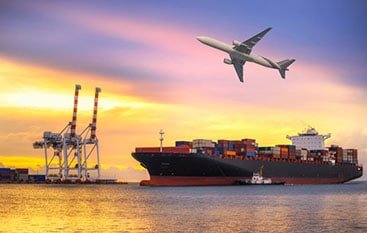What Is Freight Insurance And What Do Your Freight Insurance Rates Cover?
Your freight insurance rates protect you as an importer against potential losses to the shipment during transit and carriers for potential loss of a customer. There are many different types including shipping insurance, freight insurance, cargo insurance, moving insurance, transit insurance, and transport insurance. All of these terms are names for insurance that covers goods or merchandise against damage or loss while in transit from one location to another. There are 2 types of cargo insurance, contingent cargo, and primary cargo insurance.
Contingent Cargo Insurance
Contingent cargo freight insurance is a requirement of all freight forwarders and has a legal minimum requirement. Cargo weight is the basis for coverage; for example, $0.60 per pound.
Primary Cargo Insurance
Primary cargo insurance insures goods for their full actual value, and this can be issued per shipment or via an annual policy to cover many shipments per year. For example, if the value of the shipment is $500,000, the primary cargo insurance policy will cover $500,000.
Are You Covered?
Most carriers have freight insurance, but as an importer, you should look into separate cargo insurance such as marine freight insurance as carrier liability is often limited to $0.50 per pound rather than on the actual value of your goods. For example, if your cargo is worth $100,000 and weighs 10,000 lbs, your carrier’s liability insurance would only cover $5,000 in cargo loss.
If you require full value coverage, you should look into replacement value cargo insurance. Carriers should always know the value of the goods they are transporting. If the value of goods is not covered by the carrier’s liability coverage, they should notify the client and determine if additional insurance coverage should be purchased.
Transit Insurance within Australia
Inland cargo insurance is another type of insurance. It covers domestic shipments via land (truck and rail) and air. Ocean cargo insurance provides coverage for shipments travelling via ocean whether on boat or container ship alike.
Coverage for cargo insurance is often referred to as ‘warehouse to warehouse.’ This coverage begins when transit begins and terminates when the cargo is delivered to the final destination.
What To Consider When Deciding On Insurance:
- Know the costs and inclusions if you are responsible for arranging insurance.
- Know the details of the insurance coverage if your supplier arranges insurance.
- Check with your business insurance provider to understand what coverage is already available to you.
- Make sure you inspect the goods upon receipt so you can remedy any problems promptly. If you discover damage or loss to your shipment follow the instructions outlined in your insurance policy or certificate to submit a claim.
- Know that carriers, freight forwarders, and third-party service providers will only arrange insurance if so instructed in writing. They do not do so automatically.

